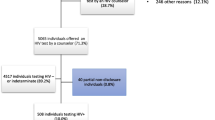Abstract
This essay argues that informed consent remains desirable for both moral and practical reasons in regard to HIV testing by physicians. At the very least, respect for consent preserves patient control over treatment and affords the opportunity for education about the nature of HIV-related disorders. Nevertheless, there do appear to be circumstances under which involuntary testing may occur especially when health care workers may have become occupationally exposed to risk of HIV infection. To eliminate conflicts between health workers and their patients, however, it is desirable to work to eliminate the stigmatizing and discriminatory effects of HIV infection that can induce persons to resist testing.
Similar content being viewed by others
References
See R. J. Blendon, K. Donelan, “AIDS, the Public, and the ‘NIMBY’ Syndrome,” inPublic and Professional Attitudes Toward AIDS Patients, D. E. Rogers, E. Ginzberg, Eds. (Boulder: Westview Press, 1989), pp. 19–41.
Illinois Revised Statutes 1987. Ch. 111 1/2, par. 7301 et seq. There were, of course, certain circumstances exempt from this requirement. Written, informed consent was not required for the screening of organs, blood, or semen used for transplantation, transfusion, or insemination. Moreover, HIV prevalence studies were allowed for institutions provided the identity of the subjects could not be retrieved.
Illinois Revised Statutes 1988 Suppl. Ch. 127, par. 55.41 et seq. See Anonymous, “Legislation Eases Consent Requirement for AIDS Test,”Chicago Tribune, July 1, 1988: sect. 1: 9.
J. Anderson, “AMA Votes for AIDS Test Without Patient OK,”Chicago Sun-Times, Dec. 12, 1991: 32.
T. F. Murphy, “Legal Liability for Pregnant Women with HIV?”Medical Ethics for Physicians 1992 (7): 3–4.
D. H. J. Hermann, “Liability Related to Diagnosis and Transmission of AIDS,”Law, Medicine and Health Care 1987 (15): 36–45.
See Anonymous, “Living with HIV: Many will Need Psychiatric Help,”Clinical Psychiatry News 1987 (Nov.): 1; also see Anonymous “Underscore Urgency of HIV Counseling: Several Suicides Follow Positive Tests,”Clinical Psychiatry News 1987 (Oct.): 1.
Anonymous, “AIDS Drug Found to be Carcinogen,”Chicago Tribune, Dec. 6, 1989: sect. 1, 11.
Jeremy Cherfas, “AZT Still on Trial,”Science 1989 (246): 882.
T. F. Murphy, “Is AIDS a Just Punishment?”Journal of Medical Ethics 1988 (14): 154–160.
M. Siegler, “Confidentiality in Medicine — A Decrepit Concept,”New England Journal of Medicine 1982 (307): 1518–1521.
M. R. Schwarz, “Physicians' Attitudes Toward AIDS,” and G. Gee, “Nurse Attitudes and AIDS,”Public and Professional Attitudes Toward AIDS Patients, pp. 31–41, 43–53.
H. L. Dalton, “AIDS in Blackface,”Daedalus 1989 (summer): 205–227.
R. J. Blendon, K. Donelan, “Discrimination against People with AIDS,”New England Journal of Medicine 1988 (319): 1022–1026.
K. Mayer, “The Clinical Challenges of AIDS and HIV Infection,”Law, Medicine and Health Care 1986 (14): 281–289.
T. C. Quinn, D. Glasser, R. O. Cannon, et al., “Human Immunodeficiency Virus Infection among Patients Attending Clinics for Sexually Transmitted Diseases,”New England Journal of Medicine 1988 (318): 197–203.
R. Weiss, S. Thier, “HIV Testing is the Answer — What's the Question?New England Journal of Medicine 1988 (319): 1010–1012.
G. H. Friedland, “Early treatment for HIV,”New England Journal of Medicine 1990 (322): 1000–1002.
J. Ruedy, M. Schecter, J. S. G. Montaner, “Zidovudine for Early Human Immunodeficiency (HIV) Infection: Who, When, and How?Annals of Internal Medicine 1990 (112): 721–723.
Centers for Disease Control, “CDC Revision of Surveillance Case Definition for Acquired Immunodeficiency Syndrome,”Morbidity and Mortality Weekly Report 1987 (36 suppl. no. 1S): 3S–15S.
See D. G. Ostrow, T. J. Coates, “Psychological counseling for HTLV-III antibody testing” (pp. 124–133) and A. Novick, “Ethical Considerations in Risk Reduction Advising” (pp. 39–42) inBiobehavioral Control of AIDS, D. G. Ostrow, Ed. (New York: Irvington Publishers, 1987).
Anonymous, “Advises AZT Course after a Needle Stick,”Skin & Allergy News 1990 (Jan.): 1.
J. M. A. Lange, C. A. B. Boucher, C. E. M. Hollak, et al., “Prophylaxis after Accidental Exposure to HIV-1,”New England Journal of Medicine 1990 (322): 1375–1377.
Illinois Department of Public Health,AIDS/HIV Surveillance Report 1991 (October).
See T. A. Brennan, “Removing Barriers to Health Care for People with HIV-Related Disease: A Matter of Law or Ethics?” inPublic and Professional Attitudes Toward AIDS Patients, pp. 55–73.
R. Gillon, “Testing for HIV without Permission,”British Medical Journal 1987 (294): 821–23.
L. Gostin, “The Nucleus of a Public Health Strategy to Combat AIDS,”Law, Medicine and Health Care 1986 (14): 226–230.
L. Kopelman, “Ethical Issues in AIDS Research: HIV Screening without Consent,”Journal of Medicine and Philosophy (forthcoming).
Author information
Authors and Affiliations
Rights and permissions
About this article
Cite this article
Murphy, T.F. The ethics of HIV testing by physicians. J Med Hum 14, 123–135 (1993). https://doi.org/10.1007/BF01141685
Issue Date:
DOI: https://doi.org/10.1007/BF01141685




